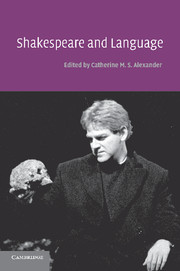Book contents
- Frontmatter
- Contents
- List of contributors
- Editor's note
- 1 Shakespeare and language: an introduction
- 2 Shakespeare's language and the language of Shakespeare's time
- 3 The foundations of Elizabethan language
- 4 Shakespeare's talking animals
- 5 Some functions of Shakespearian word-formation
- 6 Shakespeare and the tune of the time
- 7 Shakespeare's Romeo and Juliet: the places of invention
- 8 Shakespeare's thematic modes of speech: Richard II to Henry V
- 9 Hamlet and the power of words
- 10 The art of the comic duologue in three plays by Shakespeare
- 11 Hamlet's ear
- 12 ‘Voice potential’: language and symbolic capital in Othello
- 13 The aesthetics of mutilation in Titus Andronicus
- 14 ‘Time for such a word’: verbal echoing in Macbeth
- 15 Household words: Macbeth and the failure of spectacle
- 16 Late Shakespeare: style and the sexes
- Index
5 - Some functions of Shakespearian word-formation
Published online by Cambridge University Press: 15 December 2009
- Frontmatter
- Contents
- List of contributors
- Editor's note
- 1 Shakespeare and language: an introduction
- 2 Shakespeare's language and the language of Shakespeare's time
- 3 The foundations of Elizabethan language
- 4 Shakespeare's talking animals
- 5 Some functions of Shakespearian word-formation
- 6 Shakespeare and the tune of the time
- 7 Shakespeare's Romeo and Juliet: the places of invention
- 8 Shakespeare's thematic modes of speech: Richard II to Henry V
- 9 Hamlet and the power of words
- 10 The art of the comic duologue in three plays by Shakespeare
- 11 Hamlet's ear
- 12 ‘Voice potential’: language and symbolic capital in Othello
- 13 The aesthetics of mutilation in Titus Andronicus
- 14 ‘Time for such a word’: verbal echoing in Macbeth
- 15 Household words: Macbeth and the failure of spectacle
- 16 Late Shakespeare: style and the sexes
- Index
Summary
Many critics of Shakespeare's style have commented on his lexical innovations, but only too often exemplification has consisted of random listing where neologisms such as bare-faced, countless, distrustful, dog-weary, ensconce, fancy-free, ill-got, lack-lustre and crop-ear have been quoted without any analysis of the patterns on which they were formed, the underlying grammatical relationships in the compounds or the purposes for which they were coined. Some scholars have discussed the characteristics of Shakespeare's diction in general, without distinguishing his neologisms; others have concerned themselves with individual methods of word-formation, such as functional conversion, or have investigated the effect of particular neologisms to the neglect of general linguistic considerations. At the other extreme, Franz's grammar lists all the types of word-formation exemplified in Shakespeare's usage, but without providing any guidance, except casually, on the extent of their originality or their purpose, while in another comprehensive work, Jespersen's grammar of post-medieval English, Shakespearian examples are quoted only as incidental items in a general survey. The lack of any reasoned account of the principles directing Shakespeare's lexical creativity has led to the kind of vague, subjective assessment of its nature and purpose which characterizes certain neologisms in Troilus and Cressida, including conflux, protractive, persistive, appertainments, soilure and embrasures, as ‘strange and shapeless, fashioned for argument rather than delight…. They seem endowed with a deliberate harshness to which the frequent ending of -ive, as in persistive and -ure as in soilure give emphasis’.
- Type
- Chapter
- Information
- Shakespeare and Language , pp. 79 - 100Publisher: Cambridge University PressPrint publication year: 2004



